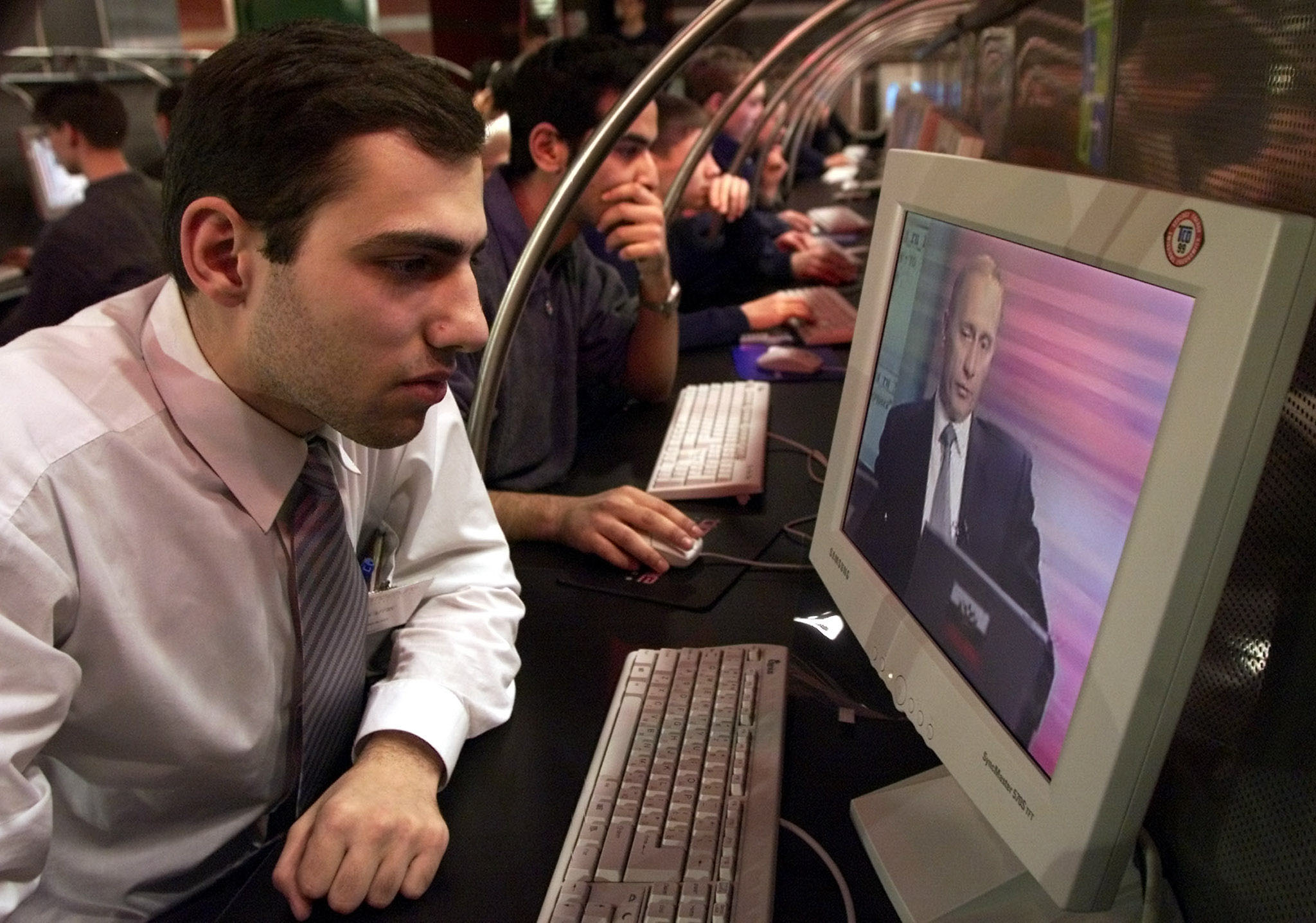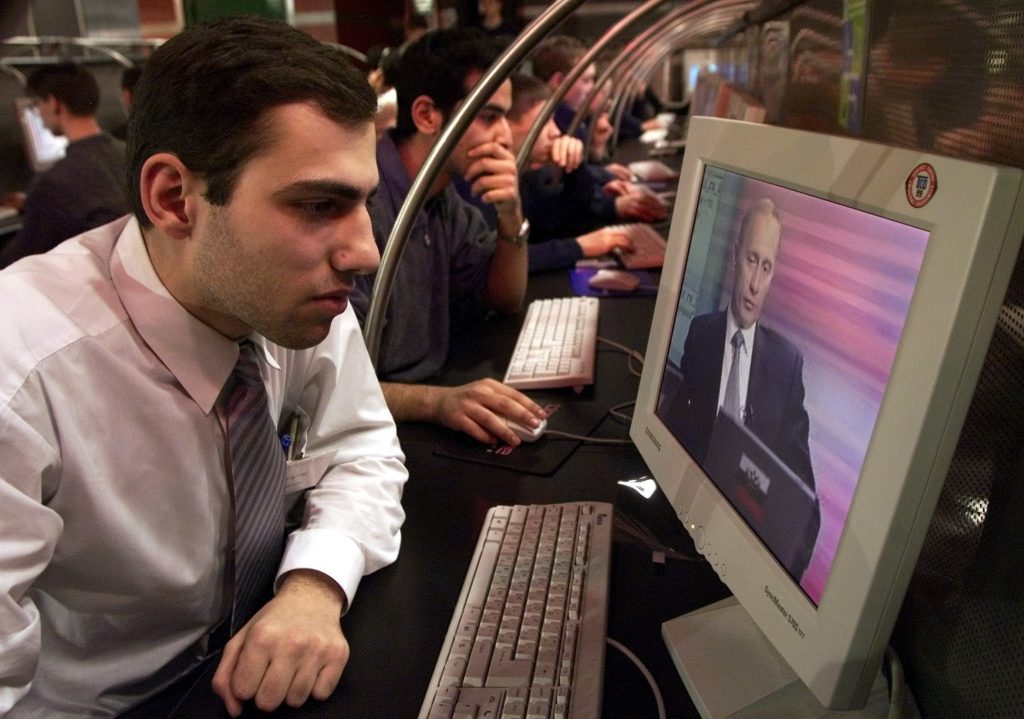 A vicious diatribe recently exploded on the Russian Internet between several Ukrainian journalists and bloggers on one side, and prominent Russian opposition bloggers and activists on the other. The discourse reflects the deep divide between the two nations, which has continued to deteriorate since the events of 2014.
A vicious diatribe recently exploded on the Russian Internet between several Ukrainian journalists and bloggers on one side, and prominent Russian opposition bloggers and activists on the other. The discourse reflects the deep divide between the two nations, which has continued to deteriorate since the events of 2014.
The debate has been brewing for a long time, but it took its final shape when a well-known Ukrainian journalist, Vitaly Portnikov, wrote “A Letter to My Moskal Friends” on the Russian opposition site Grani.ru. The term Moskal was once a historical designation for residents of the Grand Duchy of Moscow, but evolved in the twentieth century to become a derogatory name for residents of the Russian Federation.
In his letter, Portnikov appealed to his friends in Russia who oppose President Vladimir Putin to stop meddling in Ukrainian affairs, and to keep in mind that Russia and Ukraine are not brotherly nations and never have been. Any dialogue between us, he wrote, should start with an act of repentance akin to that of German Chancellor Willy Brandt, who in 1970 knelt down at a monument dedicated to the victims of the Warsaw Ghetto Uprising.
According to Portnikov, Russians should repent not only the deaths of Ukrainian activists in the Maidan in 2014, and the deaths of Ukrainian volunteers and soldiers who were killed in the war in eastern Ukraine, but also Russia’s three hundred years of enslavement of Ukraine.
Portnikov specifically mentioned four people in his letter: Olga Romanova, a Russian journalist and director of the civil rights organization “Jailed Russia”; Russia’s top blogger Rustem Agdamov; Russian writer and journalist Arkady Babchenko; and the creator of the independent TV Channel Sotnik-TV, Sasha Sotnik. All are staunch opponents of Putin and his aggression against Ukraine.
Portnikov’s letter was not the first of its kind. Anna Amargo, a popular Ukrainian blogger, made similar statements, writing to Russian opposition activists on her Facebook page, “Please, do not come to us either as mentors, nor as teachers, volunteers, defenders, helpers, guides, instigators, or builders of the new Rus.” This entry received over 5,500 “likes.”
But perhaps the most radical point of view was expressed by Yury Biryukov, a Ukrainian businessman and advisor to President Petro Poroshenko. In January he wrote on his Facebook page, “I have never heard of a single military train heading toward my country being derailed (in Russia)… I have never heard of mass sabotage actions or unusual explosions in your pseudo-empire. By continuing to live there [in Russia], by working there, by receiving your salaries there, by paying taxes, YOU CONTINUE TO TAKE PART IN THE WAR AGAINST MY COUNTRY.”
When the conflict erupted, former Russian Deputy Foreign Minister Georgy Kunadze—who immediately took the Ukrainian side in 2014—responded to Plotnikov on his Facebook page. Though expressing his dismay about the fratricidal war, Kunadze pointed out that it would be unwise to deny the close links between Russians and Ukrainians: the two peoples share common heroes in history, a common cultural heritage, thousands of mixed marriages, and there are millions of Ukrainians who live in Russia, as well as millions of Russians living in Ukraine. Declaring hatred toward every Russian, as Biryukov has done, will not help Ukraine, wrote the former senior Russian diplomat. He ended his post with the words “Glory to Ukraine.”
Needless to say, each of these posts generated long chains of comments in which neither Russian nor Ukrainian writers minced words, and some harangues turned ugly.
The roots of this polemic go back to the time of the early post-Maidan uprising days, when Russian liberals embraced Ukraine’s Revolution of Dignity as a symbol of hope for Russia. Kunadze put it succinctly: “If a country as similar to us as Ukraine is able to overcome the post-Soviet syndrome before us and becomes a successful contemporary state, its example could prove infectious for Russia. In this case, the victory of Ukraine [would be] a stimulus for changes in Russia.”
A pilgrimage to Kyiv became a must for any Russian opposition activist, and in April 2014, Mikhail Khodorkovsky, who had recently been released from a Russian jail, launched the first of many attempts to conduct a Russian-Ukrainian dialogue. The late Russian-Georgian businessman Kakha Bendukidze spent several months in Kyiv suggesting the urgent reforms Ukraine should immediately undertake.
For Russia’s opposition, Ukraine was the ideal place to set up a base, and many anti-Putin activists expected to use their knowledge and experience by working for the Ukrainian government and media. It was only natural for them to stress the similarity and common heritage of the two nations—the same narrative of “brethren nations” that Putin and the Kremlin used to justify Russia’s intervention in Ukraine.
For Ukraine, it was a completely different game. Prior to 2014, Ukraine had faced a serious identity crisis. The presence of Russian cultural, economic, and political factors in Ukrainians’ everyday life was too strong to be ignored. But the blood spilled on the Maidan and during the war in eastern Ukraine cemented the foundation of a new Ukrainian civil nation, in which ethnic Ukrainians, Russians, Jews, Tatars, and other citizens of Ukraine clearly distanced themselves from Russia. For Ukrainians, the phrase “brethren nations” became like a red flag to a bull. Any association with Russia and Russians is now perceived as a curse for many Ukrainians.
Regardless of how well-founded each side’s arguments are, the bitterness between them is final proof of a profound rift between Russians and Ukrainians that was caused by Putin’s aggression, and one which can never be healed completely.
Alexei Sobchenko is an independent analyst and a former US Department of State employee.
Image: An Internet surfer watches an online interview of Russian President Vladimir Putin at an Internet cafe in Moscow, March 6, 2001. Credit: Reuters

